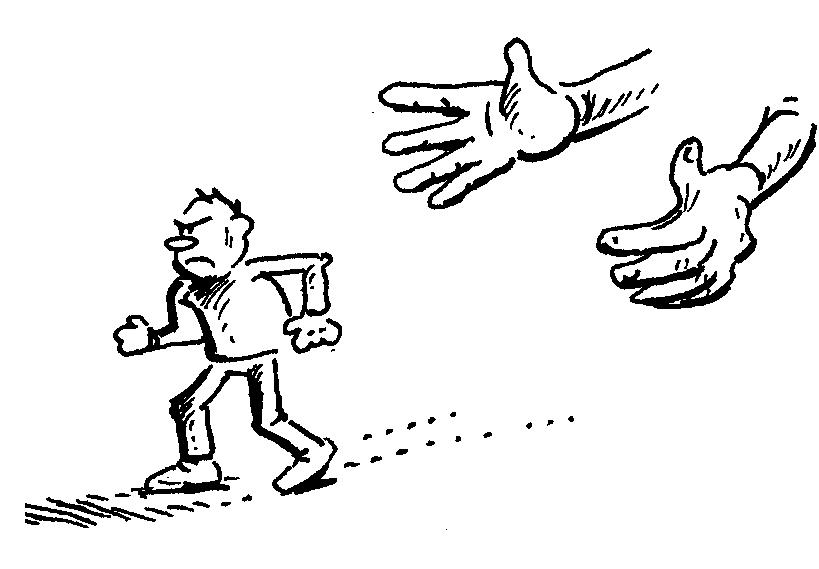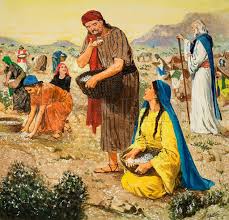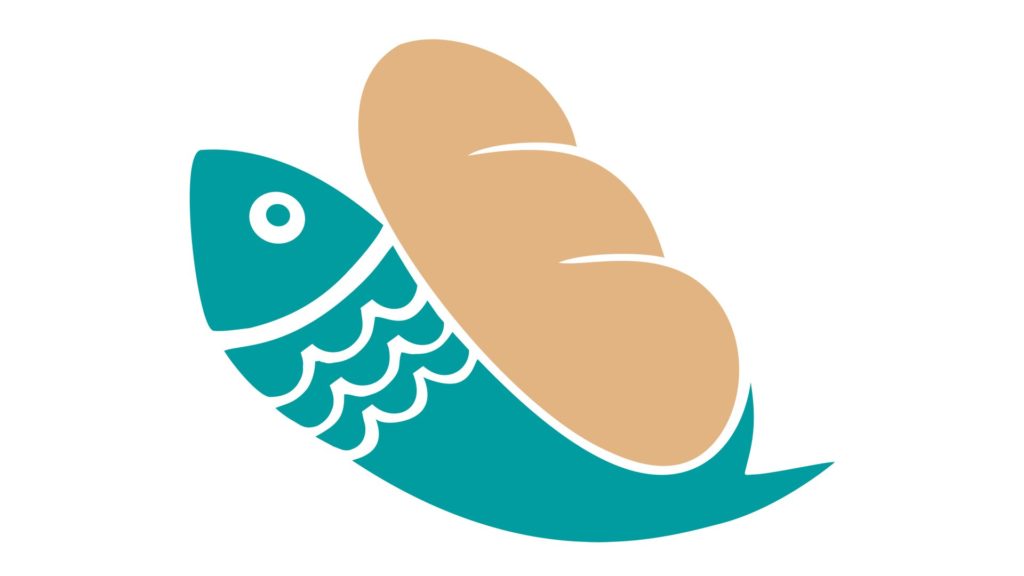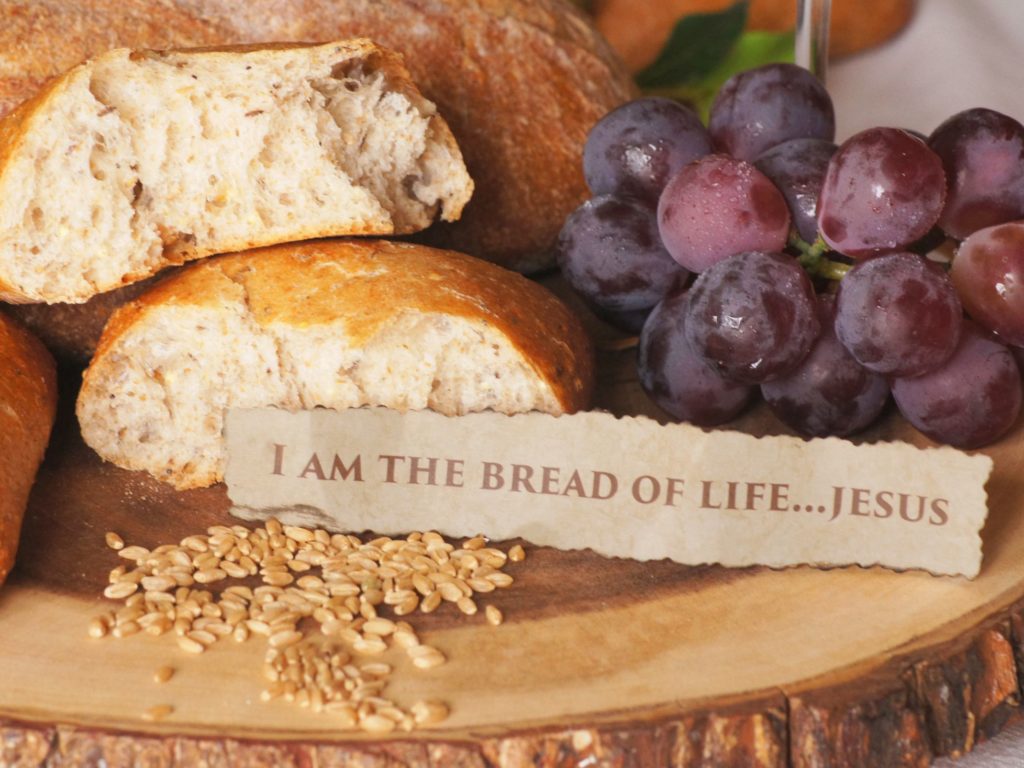Readings: Exodus 16:1-31 | 2 Corinthians 5:1–17 | Mark 4:26–34
Text: Exodus 16:1-31
Normally, the sermons follow the theme for the day set by the lectionary. The lectionary is the schedule of Old Testament, Psalm, Epistle, and Gospel readings for a given day. It’s a great tool which the Christian Church has used for centuries in conjunction with the shape of the Church year. But I want the opportunity to teach the whole congregation the lessons which the group has been learning in Sunday Bible study.

St. Paul teaches us that, “All Scripture is breathed out by God and profitable for teaching, for reproof, for correction, and for training in righteousness.” (2 Timothy 3:16) As we’ve been studying Exodus, it’s become clear that this has application for God’s people in every age—especially ours where Biblical literacy is even worse than English literacy. What was recorded in the Old Testament isn’t to be forgotten, but rather viewed through the Cross. St. Paul also explains, “These things happened to them as an example, but they were written down for our instruction, on whom the end of the ages has come.” (1 Cor. 10:11) Sadly, many of you have fallen into the habit of minimizing Sunday to the Divine Service alone, and neglecting the lessons of Bible study. If there is some way we can make it so more of the congregation is present at Bible study, I’m all ears.
But I also don’t want you to miss out on the lessons which our Lord and Savior gives us in these Scriptures. So, over the next four weeks, we’re going to sit at the feet of Jesus, while He teaches us from how He led the sons of Israel in the wilderness. Our first stop comes after the Lord has brought out His people from Egypt. With a strong hand and a mighty arm, with the might of the Ten Plagues, the Lord judged Pharaoh and made distinction between the Egyptians and the sons of Israel. After the Lord brought them through the Red Sea on dry ground, but drown the host of Pharaoh, they saw their former oppressors dead on the side of the Red Sea and they sang: “Sing to the Lord, for he has triumphed gloriously; the horse and his rider he has thrown into the sea.” (Exodus 15:21)
With that refrain two months fresh in their minds, they come to the Wilderness of Sin.[1] The whole congregation begins complaining: “Would that we had died by the hand of the Lord in the land of Egypt, when we sat by the meat pots and ate bread to the full, for you have brought us out into this wilderness to kill this whole assembly with hunger.” Yes, this is the same group who possibly still had dust from the bottom of the Red Sea on the bottom of their sandals. They are actually thinking that death in Egypt as slaves would be preferable to their current situation.

How quickly our affections turn away from God! It’s easy to praise Him while things are going in our favor. But that isn’t faith (or at least it isn’t faith which is being exercised). It’s easy to confess that He is our God when He is doing things we like. But, in order to see what’s really in our hearts, God makes things get hard and painful. Is He still going to be your God, or just an afterthought when your health fails? When your mixed marriage goes south, are you going to choose to serve Him or please your spouse? You may have everything you could want right now, but what about when the money dries up? It’s in these wilderness times when the Lord exposes either the strength—or more often the weakness—of our faith.
We might want to look down on the Israelites and call them foolish because we can look on the facing page of our Bible how God had delivered them. But never underestimate the weakness, forgetfulness, and fickleness of their sinful flesh and yours.
But listen to how the Lord responds to their grumbling! No doubt it’s with far more patience that some of us would:

“Behold, I am about to rain bread from heaven for you, and the people shall go out and gather a day’s portion every day, that I may test them, whether they will walk in my law or not. 5 On the sixth day, when they prepare what they bring in, it will be twice as much as they gather daily.”
Here in the wilderness, the Lord provides for the people in a visible and miraculous way. He gives this miraculous bread from heaven. He did this to teach us about His character is as our Father in heaven. Yet how often do we find ourselves doubting that? We have so much knowledge of the resources we have at our disposal, that we get the idea we’re more in charge of our destiny. As a testimony of this, we try to control procreation, engineer away scarcity, and trust that medical science can cheat death for us.
God allows this illusion to deceive us for a time, but then the reality hits again. God hasn’t changed between then and now. He still is ever the Creator of Life, the One who wisely provides for the needs of all, and Him who keeps our going out and our coming in forever more [Ps. 121] What changes, like the Israelites, is our attitude toward His provision. Now, we’re able to know far more about what He provides. But what we do with that information is the problem: We worry. We doubt He will provide enough. We think the future depends on our calculations.
14 And when the dew had gone up, there was on the face of the wilderness a fine, flake-like thing, fine as frost on the ground. 15 When the people of Israel saw it, they said to one another, “What is it?” For they did not know what it was. And Moses said to them, “It is the bread that the Lord has given you to eat.

In order to humble us, God’s provision is a given in a way that we can only give Him glory. The very name manna comes from their wondering what this bread was. Try as we might 1make to be masters of our life (piously we call our fretting and hoarding “good stewardship”), God will show us that He is the one who provides what He will provide. “Give us this day our daily bread” He teaches us to pray. He puts it that way for a reason: so that every day, we would realize that everything in life is in His care.
The manna was a visual of this: They gathered what they needed each day, and when it came to the Sabbath rest, He provided for that as well. And God continues truly to provide for all our needs.
Today, we’re no longer tested with not being able to get things on a Sabbath day, as nearly everything is available 7 days a week. We are still tested, however, on two points, so that the Lord would know what is truly in our hearts:
First is the modern freedom of the Sabbath, that we are not forced to rest or socially pressured to go to church. When we’re given the choice, the devil and our sinful flesh are right there with excuses. It’s been a pretty good week. I’ve got family coming in town and I don’t want to seem a bad host. I’ve just got so much to get done, how can I stand to lose half the day? And you can look around to see what that freedom has resulted in. Our daily life is just so much more satisfying that we want more of it, and lose our appetite for the good portion which will not be taken away for eternity.
So the lesson from God providing double on the day before the Sabbath is that we too ought to plan our week around the rest He gives us on Sunday. He says, “See! The Lord has given you the Sabbath” (v. 29) because it is actually His gift to provide us with more than the stuff we need to keep this temporal life rolling. He is saying our lives are built on being children of God for eternity as well as today.

The other test of our hearts is what we do with the daily bread we receive from God, especially the money. There are so many expenses, so many ways to spend money from coffee stands to good deals online, that it seems to us there’s never enough money for everything. Our deceitful hearts focus on how much money, but don’t notice the priorities we choose. The Patriarchs Abraham and Jacob, before they were ever commanded, freely chose to give a tenth of what they had to the Lord. For Israel, that translated into sacrifices, temple furnishings, and provision for the priests. Today, the money which God’s people offer to Him carries on His work in this congregation and the Church at large. When it comes to giving, St. Paul recalls the manna as assurance that God’s provision is more faithful than we can judge: “13 For I do not mean that others should be eased and you burdened, but that as a matter of fairness 14 your abundance at the present time should supply their need, so that their abundance may supply your need, that there may be fairness. 15 As it is written, ‘Whoever gathered much had nothing left over, and whoever gathered little had no lack.’” (2 Cor. 8:13-15)
And finally, together with all these lessons, the manna itself recalls the full provision of God which became manifest in His Son, Jesus Christ. This is the dialog that happened after the Feeding of the Five Thousand in John 6:

“31 tOur fathers ate the manna in the wilderness; as it is written, ‘He gave them bread from heaven to eat.’ ” 32 Jesus then said to them, “Truly, truly, I say to you, it was not Moses who gave you the bread from heaven, but my Father gives you the true bread from heaven. 33 For the bread of God is he who comes down from heaven and gives life to the world.” 34 They said to him, “Sir, give us this bread always.” 35 Jesus said to them, “I am the bread of life; whoever comes to me shall not hunger, and whoever believes in me shall never thirst.”
In this way, it comes back around so that we see ourselves as those for whom God is providing in the wilderness. We are just as needy…and prone to foolishness…as the Israelites. But with the Holy Spirit’s help, He makes us mindful of how desolate this world is in comparison to the glories which are to be revealed to us in the age to come [Rom. 8:18]. He also makes us mindful of true hunger and its remedy. The Israelites had hungry stomachs, which the manna satisfied. But underlying that is the spiritual hunger we feel. And in that, we’re not all at the same place. Some of us are acutely aware of our spiritual hunger and take heart in what the Lord says, “Blessed are those who hunger and thirst for righteousness, for they shall be satisfied.” (Matt. 5:6). Others are more comfortable and feel as though they’re fairly strong. And to all those called by the Gospel, He gives not just bread, but “The bread of heaven which gives life to the world…I am the Bread of Life; whoever comes to me shall not hunger, and whoever believes in Me shall never thirst.” This is what He is doing for you when He feeds you at the altar. “What is it?” Manna? “Take eat; this is My Body, broken for you” “Take drink; this is My Blood, shed for you.” It is both miraculous and tangible, and in this holy food, He feeds you with what you need for the nourishment of your soul.
From this account of the Bread of Heaven, we learn how our Father in heaven rebukes our grumblings and our doubts, and yet in steadfast love provides for us. Recognizing this, may we receive our daily bread with thanksgiving! But still more He shows us the spiritual wilderness in which we find ourselves, and cares for our souls. In response to His glorious grace, let us stand and sing the prayer, “Feed Thy Children, God Most Holy” on page 774.
Feed Thy children, God most holy;
Comfort sinners poor and lowly.
O Thou Bread of Life from heaven,
Bless the food Thou here hast given!
As these gifts the body nourish,
May our souls in graces flourish
Till with saints in heav’nly splendor
At Thy feast due thanks we render. (LSB 774)
Text: © 1941 Concordia Publishing House. Used by permission: LSB Hymn License no. 110004659

[1] This is a proper name. It’s just a coincidence that it matches the English word.
Leave a Reply